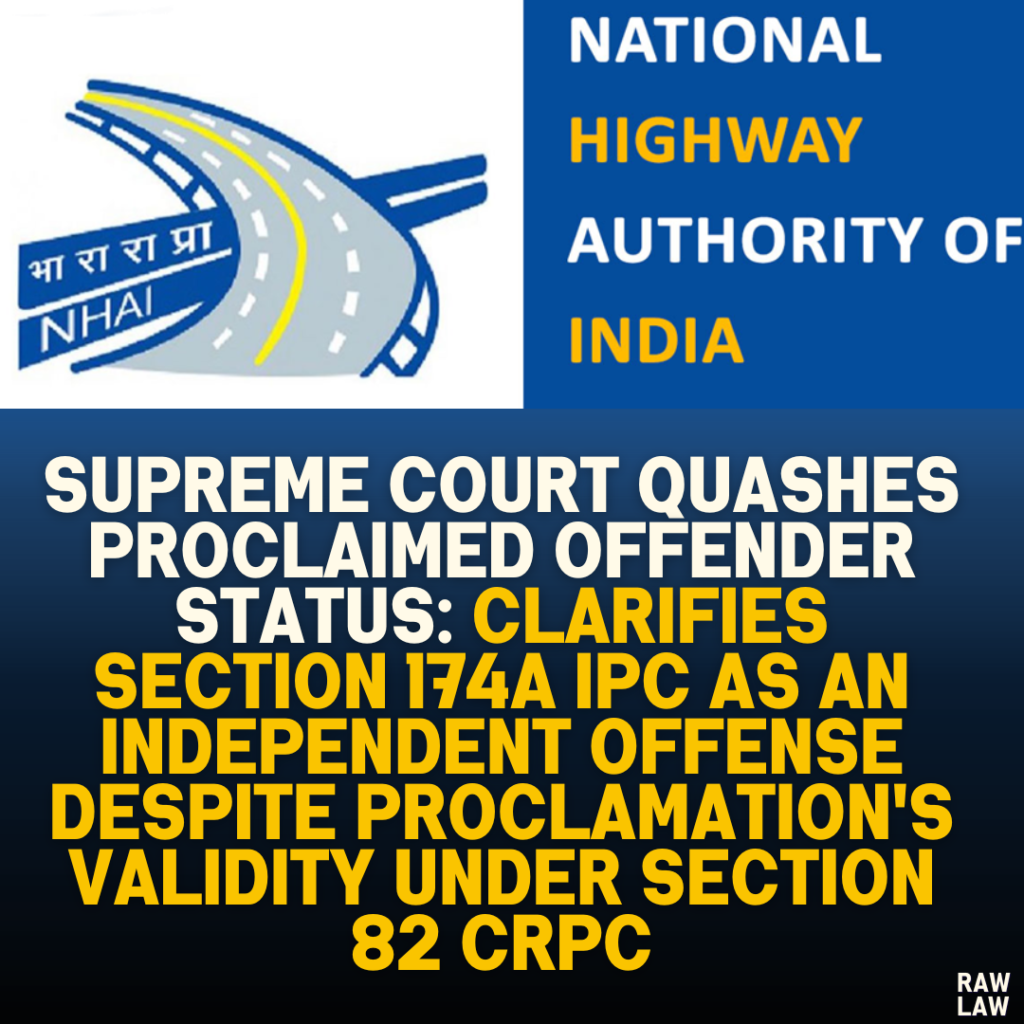Court’s Decision
The Supreme Court quashed the proclaimed offender status of the appellant and closed all related criminal proceedings, including those under Section 174A IPC. The Court clarified that Section 174A IPC creates an independent and substantive offense for failing to appear as per a proclamation under Section 82 CrPC. Even if the proclamation ceases to exist, proceedings under Section 174A IPC can continue. However, considering the appellant’s acquittal in the connected trial and the resolution of monetary disputes, further proceedings were deemed unnecessary.
Facts
- The appellant’s company secured a contract with the National Highways Authority of India (NHAI) for an 8-lane highway project.
- Disputes arose over the performance of subcontracted work and payment issues, leading to the termination of the appellant’s contract by NHAI.
- Allegations of dishonored cheques issued by the appellant led to the filing of a complaint in 2010, resulting in summons and a proclamation under Section 82 CrPC due to the appellant’s failure to appear in court.
- The appellant was declared a proclaimed offender in 2016. Despite being arrested in 2022, he was released on bail the same day after partially settling monetary disputes with the complainant.
- The High Court dismissed the appellant’s petition to quash these proceedings, prompting the appeal to the Supreme Court.
Issues
- Can a proclaimed offender status under Section 82 CrPC persist after acquittal in the connected trial?
- Does the subsistence of a proclamation under Section 82 CrPC remain necessary for prosecution under Section 174A IPC?
Petitioner’s Arguments
- The appellant had been acquitted in the trial under Section 138 of the Negotiable Instruments Act, eliminating the basis for continued proceedings.
- The proclaimed offender status and proceedings under Section 174A IPC became redundant due to the resolution of monetary disputes.
Respondent’s Arguments
- The High Court relied on precedent to affirm that the validity of a proclamation under Section 82 CrPC could only be challenged in the issuing court.
- Proceedings under Section 174A IPC were lawful, as the appellant failed to comply with the proclamation.
Analysis of the Law
- Section 82 CrPC:
- Enacted to ensure the appearance of individuals avoiding legal proceedings.
- Proclamation is issued when a person evades a warrant, requiring them to appear within a specific timeframe.
- Section 174A IPC:
- Introduced in 2005 as a substantive offense for failing to comply with a proclamation under Section 82 CrPC.
- Creates independent penal consequences, even if the proclamation is later nullified.
- Judicial Precedents:
- Kartarey v. State of U.P.: Defined absconding as evasion of legal process, even within one’s residence.
- Vimlaben Patel v. Vatslaben Patel: Highlighted the purpose of Section 82 as securing the attendance of absconding individuals.
- Mukesh Bhatia v. State (Delhi High Court): Held that Section 174A IPC remains enforceable even if the proclamation is no longer valid.
Precedent Analysis
The Court supported interpretations that Section 174A IPC serves as a standalone offense, meaning the act of failing to appear at the time specified in a proclamation under Section 82 CrPC constitutes an infraction, independent of the proclamation’s later status.
Court’s Reasoning
- Interplay Between Sections 82 CrPC and 174A IPC:
- Prosecution under Section 174A IPC can only begin after a proclamation under Section 82 CrPC is issued.
- Once initiated, the offense under Section 174A IPC is independent of the proclamation’s subsistence.
- Implications of Acquittal:
- If the accused is acquitted in the primary offense, continuation of proceedings under Section 174A IPC may be unwarranted.
- The trial court can consider such developments to conclude proceedings appropriately.
Conclusion
The Supreme Court ruled that:
- Section 174A IPC creates a substantive offense independent of the proclamation’s ongoing validity.
- The appellant’s proclaimed offender status and all related criminal proceedings were quashed due to acquittal in the primary offense and the resolution of disputes.
- Criminal proceedings under Section 174A IPC must align with the broader justice framework and account for subsequent developments, such as acquittals.
Implications
This judgment reinforces that procedural defaults (like failing to appear under a proclamation) attract independent penal consequences but must be contextually assessed. The ruling ensures fairness by balancing enforcement of legal obligations with justice for individuals acquitted of primary charges.



